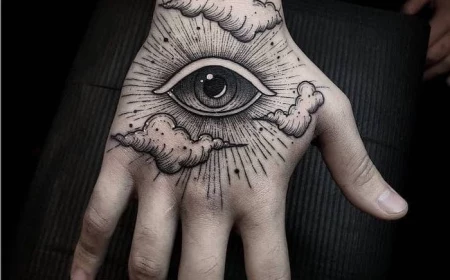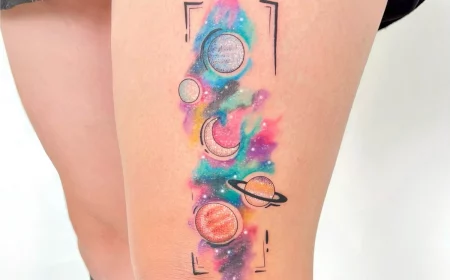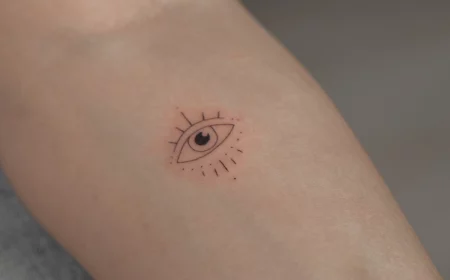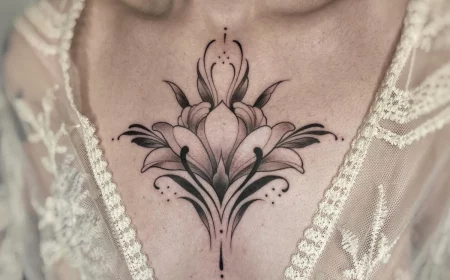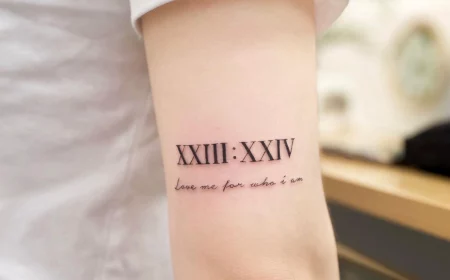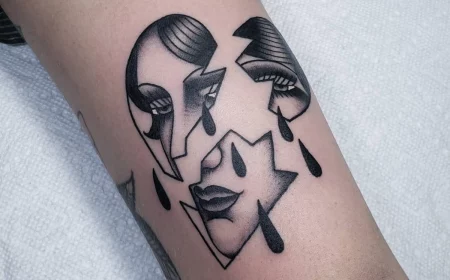Getting a Sibling Tattoo? Read This Pro’s Guide First
Over my career, I’ve had all sorts of people sit in my chair, but few appointments are as cool as the ones with siblings. There’s this specific energy they bring in—sometimes it’s pure, nervous excitement, other times it’s the easy confidence that only comes from a shared history. I once worked with a brother and sister who wanted to honor a hiking trail they’d trekked with their dad before he passed. We spent the first hour just chatting, looking through their photos, and sketching out the mountain range. The tattoos we created weren’t just lines on their skin; they were a story. And that’s what this is all about.
In this article
This isn’t some gallery of trendy designs you’ll regret. Think of it as a roadmap to help you and your sibling create something that genuinely lasts, both on your skin and in your hearts.
The Foundation: Making It Truly Personal
Honestly, most people start by scrolling online for popular symbols like infinity loops or anchors. While that’s a place to start, the tattoos that really hit different come from a much more personal spot. Your tattoo should be a piece of your unique story, not a generic stamp.

So, where do you begin? By asking the right questions. What experiences do you two share that nobody else gets? Think about those inside jokes, a favorite vacation spot, or maybe a tough time you pulled each other through. A simple outline of a pine tree might mean nothing to a stranger, but for two siblings who spent their childhood summers at a cabin in the woods, it means everything. The design doesn’t have to be complicated to be powerful. Often, the simplest ideas are the strongest.
Brainstorming That Actually Works
Instead of googling “sibling tattoo ideas,” grab a piece of paper and just make some lists together. Don’t even think about the tattoo yet, just the concepts:
- Shared loves: A specific band, a video game you poured hundreds of hours into, a favorite food, a book that changed you both.
- Important places: The house you grew up in, a city you both fell in love with, a landmark from a family trip.
- Private jokes: A goofy word you made up, a dumb drawing you used to pass back and forth, a symbol for a memory that still makes you laugh.
- Symbols of support: Did one of you act as a rock for the other? Think about a design that represents that strength or guidance in your own way.
I once tattooed a brother and sister with two tiny, simple teacups. They told me that no matter how busy their lives got, they always promised to make time for tea and a real conversation. That’s the kind of depth to aim for. Once you have these core ideas, a good artist can help you transform them into something beautiful.

How Tattoos Even Work (The Quick & Dirty)
Understanding the basics here will make you a much smarter client. Your skin has layers. The top one, the epidermis, is constantly shedding. If ink only went there, your tattoo would literally flake away in a few weeks. The real magic happens in the layer below, the dermis. It’s stable.
A pro tattoo machine uses super-fine needles to deposit tiny drops of ink right into that sweet spot. The needles move incredibly fast, piercing the skin anywhere from 50 to 3,000 times a minute. Your body’s immune system freaks out a little and sends cells to go “eat” the foreign ink particles. But the ink particles are too big for the cells to get rid of, so they just get trapped there, held in place. You’re basically seeing the ink suspended in the dermis, right through your transparent top layer of skin. A tattoo is, for all intents and purposes, a beautiful, controlled scar.

This is exactly why an artist’s skill is so critical. If they go too deep, the ink can “blow out,” creating a permanent, blurry mess under your skin. Too shallow, and the ink settles in the epidermis, leading to a faded, patchy heal. A true professional knows how to feel the difference in skin on a bicep versus a rib cage and adjusts their machine on the fly. That’s a skill that takes years to master.
Choosing Your Artist Is Everything
This is the most important decision you’ll make. You aren’t buying a commodity; you’re commissioning a custom piece of art. So please, don’t choose based on price. Good tattoos aren’t cheap, and cheap tattoos are never good.
What to Look For in a Portfolio
First, you need to find their work. Fire up Instagram and search hashtags like
[yourcity]tattoo or
finelinetattooartist. That’s where the best, most current portfolios live these days. When you’re scrolling, look past the cool drawings and focus on the technical skill:
- Clean Lines: Are the lines solid and smooth? Or are they wobbly and shaky?
- Smooth Shading: For black and grey work, are the gradients buttery smooth, or do they look patchy?
- Saturated Color: If they use color, is it bright and packed in evenly? Or does it look kind of washed out?
- HEALED PHOTOS: This is the big one. A fresh tattoo almost always looks good. The true test is how it looks a year later. If an artist’s portfolio is all glossy, fresh tattoos and no healed shots, that’s a red flag. Pros are proud of how their work lasts.

Okay, How Do I Actually Contact Them?
People get really intimidated by this, but it’s easy if you know what to include. A pro artist is busy, so make it simple for them. Find the contact form on their website or their booking email and send a clear, concise message.
Quick tip: Here’s what to include in that first email:
- Your Idea: Be specific! “A minimalist teacup” is better than “something to represent our bond.”
- Reference Photos: Attach 2-3 images that show the style and subject you like.
- Size & Placement: Give an approximate size in inches and say where on the body it’s going (e.g., “about 3 inches tall on the inner forearm”).
- Mention It’s a Sibling Tattoo: Let them know you’re a pair! Artists often enjoy these projects.
Heads up! In-demand artists can be booked out for months, sometimes even a year. Start your research and reach out early. When you go for a consultation, check out the shop. It should be spotless and smell like disinfectant, not stale air. If the artist is dismissive or pressures you, walk away. This is a partnership.

Styles and Placement a Pro Would Recommend
The style you choose can completely change the vibe of your idea. For siblings, it’s also a great way to get tattoos that are linked but not identical. Maybe one of you gets the linework version, and the other gets a fully shaded one.
A few popular styles that work great:
- American Traditional: Think bold black outlines and a classic color palette. These designs are built to last and look great from across a room.
- Fine-Line: Super delicate and detailed, perfect for script or minimalist symbols. But a word of caution: these require a real expert. If the lines are too fine or not put in properly, they can fade or blur over time. They often need a touch-up to stay crisp. By the way, most artists will do the first touch-up for free or a small setup fee within the first year. Just ask about their policy!
- Black and Grey: Uses various shades to create realistic, almost 3D images. Amazing for meaningful objects or nature scenes.
- Minimalist/Geometric: Simple lines and shapes. Incredibly powerful and perfect for a more discreet look.

Where Should It Go?
Placement is key. Hands and feet tattoos look cool, but the skin regenerates so quickly there that they fade fast and require frequent touch-ups. The torso, upper arms, and thighs are prime real estate for longevity. As for pain… yeah, it’s going to hurt. But some spots are way better than others. The outer bicep? A breeze, you could probably zone out. The ribs or top of the foot? Yeah, that’s gonna be spicy. Definitely have a big lunch before that session.
If one of you has a much lower pain tolerance, that’s totally okay! Just be honest with your artist. You could choose a less sensitive spot, or they can plan for more breaks. No shame in that game.
The Healing Process Is YOUR Job
Alright, the tattoo is done. It looks amazing. Now, it’s on you to make sure it stays that way. Your artist will give you aftercare instructions—follow them to the letter. A healing tattoo is an open wound, so treat it that way. No swimming, no baths, no hot tubs, and no direct sun for at least 2-3 weeks. I once had a client go camping and wade in a creek a few days after getting a calf tattoo. He came back with a nasty infection that scarred the art. Don’t be that guy.

My go-to method these days is using a clear, medical-grade adhesive film (you’ll see brands like Saniderm or Tegaderm). The artist applies the first piece, which you leave on for 24 hours. You’ll see some gross-looking fluid build up under it—that’s normal, just plasma and excess ink. After a day, you’ll remove it in the shower, gently wash the tattoo with a mild, unscented soap (like Dial Gold), pat it dry with a paper towel, and apply a second sheet. That one stays on for 3-5 days. After that, you’re pretty much healed. Just use a bit of gentle, unscented lotion (like Lubriderm or Cetaphil) for the next week or so.
Let’s Talk Money, Time, and Other Realities
Let’s be direct. Even for a tiny tattoo, most reputable shops have a minimum charge, usually between $100 and $150. That covers the cost of all the sterile, single-use supplies. For bigger pieces, artists typically charge by the hour. Rates can range from $150 to over $300 an hour depending on the artist’s experience and location. And yes, tipping is standard practice. If you love your tattoo and the experience, 15-25% is a great way to show it.

As for time, a simple, palm-sized design might take an hour. A more detailed piece covering your forearm could be one long 4-6 hour session, or broken into multiple sittings. Your artist will give you an estimate.
Oh yeah, one more thing: what if you have different skin tones? Will the ink look different? Yes, it can, but a good artist knows this! They’ll know how to properly saturate colors to make them pop and will be able to show you examples of their work on various skin tones so you know what to expect.
At the end of the day, a sibling tattoo is a permanent mark of a non-negotiable bond. It says, “No matter what, we started in the same place.” By doing your homework and finding a pro you trust, you’re not just getting inked. You’re creating an heirloom. And being part of that? That’s one of the best parts of my job.

Inspirational Gallery



The Golden Rule of Placement: Your bodies are different. A design that looks great on your brother’s broad shoulder might not work on your smaller wrist. A great artist will adapt the scale, orientation, and even minor details of the design to perfectly suit each person’s anatomy, ensuring both tattoos look like they belong.


What if we live in different cities?
This is common! The key is communication. Once you have a final design, one of you can get the tattoo first and send high-resolution photos (with a ruler for scale) to the other’s artist. This ensures the size, line weight, and details are as consistent as possible, bridging the distance with ink.


The skin on your hands and feet regenerates faster than almost anywhere else on your body.
What does this mean for your tattoo? Ink on fingers, palms, or the sides of your feet is notorious for fading or blurring. While trendy, these placements often require frequent, costly touch-ups to stay sharp. For a design that lasts, consider the inner wrist or ankle for a similar delicate vibe with better longevity.



Thinking about a matching phrase or quote? Consider splitting it. One of you gets the first half, the other gets the second. It’s a powerful visual representation of how you complete each other. This works beautifully for quotes like


- It creates a sense of unity even if the designs are slightly different.
- It ensures visual harmony in photos.
- It simplifies the artistic process.
The secret? Agree on a single, limited color palette. Even if one of you gets a flower and the other gets a bird, using the same two or three ink colors ties the individual pieces together into a cohesive family set.


For the Needle-Phobic Sibling: Many studios now offer topical anesthetics like Zensa Numbing Cream that can be applied before the session. Discuss this with your artist beforehand. Knowing there’s an option to significantly dull the pain can ease pre-appointment anxiety and make the experience enjoyable for everyone.


Don’t underestimate the power of a ‘negative space’ tattoo. This is where the empty skin forms the image. For example, two puzzle pieces that only show the full picture when placed together, or silhouettes that are defined by the space around them. It’s a subtle, artistic take on the concept of ‘better together’.



Fine-Line Style: Characterized by thin, delicate lines, often done with a single needle. It’s perfect for minimalist designs, script, and floral work. Heals quickly but may need a touch-up over the years to stay crisp.
American Traditional Style: Known for its bold black outlines and a limited color palette (red, green, yellow, black). These designs are built to last and age exceptionally well, making them ideal for symbolic images like hearts, daggers, or animals.
The choice depends on whether you want a subtle whisper or a bold statement.


A survey by the Tattoodo platform found that ‘meaning’ was the number one reason people chose to get a tattoo, far ahead of pure aesthetics.
This reinforces the article’s core message. Don’t just pick a cool image. Dig deep into your shared history. The tattoo that means the most is the one with a story only you two can tell.


The consultation is just as important as the tattoo session itself. This is your chance to vibe-check the artist. Do they listen to your story? Do they seem excited about your idea? A great sibling tattoo comes from a collaborative process, and you want an artist who feels like a partner in creating your piece.



If you’re honoring a family member, consider incorporating their handwriting. A signature from an old birthday card or a phrase from a letter can be turned into a stencil for a deeply personal and inimitable tattoo. Many artists are skilled at preserving the exact character of the original writing.


What about aftercare?
Healing together can be part of the bonding. Plan to use the same aftercare products. Popular, high-quality options include Hustle Butter Deluxe (a vegan favorite) or the classic Aquaphor. You can check in with each other daily, comparing notes on healing and reminding each other to moisturize!


- Before you go: Hydrate well and have a solid meal. Don’t drink alcohol the night before.
- What to bring: Your IDs, water, and a sugary snack in case your blood sugar drops.
- What to wear: Loose, comfortable clothing that allows easy access to the tattoo area.


A note on white ink: A pure white ink tattoo can look stunning and subtle when fresh, but be warned: it’s the most likely color to fade or yellow over time, especially with sun exposure. For longevity, it’s often better used as a highlight within a black or colored design rather than as the main event.



Consider your careers. While tattoos are more accepted than ever, a visible hand or neck tattoo might still be a concern in some professions. A placement on the upper thigh, ribs, or back offers a large, stable canvas while remaining easy to cover when needed.


Many modern tattoo inks are vegan, containing no animal products like glycerin from animal fat, gelatin, or bone char.
If this is important to you and your sibling, just ask! Brands like World Famous, Eternal Ink, and Dynamic Color are known for their high-quality vegan-friendly lines. A conscientious artist will be happy to confirm what they use.


Want to test-drive your design? Use a service like Inkbox or Momentary Ink. They create realistic-looking temporary tattoos from your custom design that last 1-2 weeks. It’s the perfect way to live with the placement and size for a bit before committing to the real thing.



Instead of a literal image, think abstractly. You can represent your birth order with a constellation (e.g., Orion for three siblings), use Morse code to spell out a shared motto, or get minimalist soundwaves of you saying


Think about aging. A super-detailed, tiny micro-realistic portrait might look incredible on Instagram, but over 10-20 years, lines can blur and spread. Simple designs with clear, strong lines tend to age more gracefully. Discuss long-term appearance with your artist—they know what holds up best.


- The design is perfectly mirrored on each person.
- One has a ‘lock,’ the other has the matching ‘key.’
- One has the line art, the other has the shaded version.
This approach is called a ‘diptych’ tattoo. It emphasizes that each piece is complete on its own but tells a fuller story when seen together, just like your relationship.


If you shared a love for a specific place, find its geographic coordinates. A simple string of numbers on the wrist or ankle is a minimalist, elegant, and deeply personal way to commemorate a childhood home, a favorite vacation spot, or the city where you both ended up.



Don’t haggle on price. Good tattoos aren’t cheap, and cheap tattoos aren’t good. You are paying for an artist’s skill, experience, and sterile equipment. If budget is a concern, opt for a smaller, simpler design rather than trying to find someone to do a large, complex piece for less.


How do we combine our different styles?
Let a skilled artist find the middle ground. Perhaps you love American Traditional and your sister loves fine-line florals. An artist could design a traditional-style vase holding delicate fine-line flowers, merging both aesthetics into one cohesive piece that represents you both.


A 2021 study showed that sun exposure is the single biggest factor in tattoo fading and degradation.
Protect your shared investment! Once healed, apply a high-SPF sunscreen (SPF 30+) to your tattoos whenever they’re exposed to the sun. This is especially crucial for color tattoos, which can fade much faster than black and grey work.

Capture the moment. The experience is as important as the tattoo itself. Take photos or a video in the studio (ask the artist first!). The laughter, the nervous glances, the buzzing of the needle—it all becomes part of the story you’ll retell for years to come.

